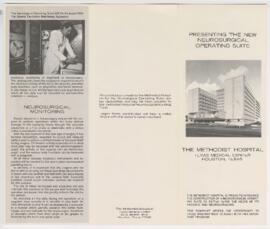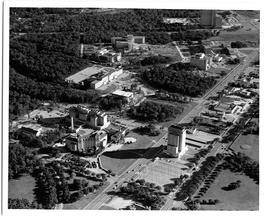This 3/4” U-Matic tape contains a lecture titled "Development of the Texas Medical Center " by Dr. William Seybold. The lecture took place April 30, 1980, and it was a part of the series “Conversations with the Past.” The recording runs 31:31 with about 30 minutes of lecture content. According to the credits, it was a Medical Community Television System Production. The recording is a duplication, in color.
(0:01) The recording begins with color bars.
(0:16) Program begins with TMC Librarian Beth White at a podium introducing Dr. William Seybold, recently retired.
(0:58) Dr. Seybold comes to the podium and begins his talk.
(2:53) Beginnings of the TMC. “In the beginning there was a dream.” Almost 40 years ago. Monroe D. Anderson, Colonel W. B Bates, John H. Freeman, Arthur Cato, Dean John W. Spies, Dr. E. W. Bertner, Dr. Frederick C. Elliott.
(5:04) Monroe D. Anderson of Anderson Clayton Company. William Bates and John Freeman helped establish the Anderson Foundation.
(7:32) Anderson died, and the Foundation was chief beneficiary. Horace Wilkins was a new trustee.
(8:55) Texas Legislature authorized a state cancer hospital in 1941. Cato, Bertner, and Spies had all been interested in a cancer hospital. Various organizations supported.
(12:18) Trustees of the Anderson Foundation met with University of Texas officials. Agreement to locate the cancer hospital in Houston. Foundation offered temporary facilities and matching funds.
(13:03) Dr. Bertner was appointed Acting Director. Land was acquired from the City of Houston, but construction had to wait until after the war. Drs. Bertner and Elliot articulated plans for a medical center.
(15:20) In 1943 the private Dental College in Houston becomes part of the University of Texas and got a site in the medical center. Bertner and Elliott envisioned Schools of Medicine, Nursing, and Public Health, as well as hospitals.
(15:55) Hermann Hospital, Methodist Hospital, a children’s hospital, a tuberculosis hospital, and perhaps others.
(16:23) Baylor College of Medicine decided to leave Dallas. Trustees of Baylor and Trustees of the Anderson Foundation made arrangements to bring the school to Houston.
(18:44) Advancement of the Medical Center after World War II. Texas Medical Center, Inc. chartered and Dr. Bertner elected President. The Anderson Foundation provided land and funds to TMC entities. Support also came from the Cullens and the Chamber of Commerce.
(21:30) Dr. Bertner’s vision for the Medical Center, including his speech to the Kiwanis.
(23:07) Dr. Seybold contends the war had established public support for medical research.
(24:18) Dr. R. Lee Clark, Jr.’s appointment as Director of M. D. Anderson Hospital for Cancer Research in 1946. The opening of Baylor’s new building in 1948. The appointment of Dr. Michael DeBakey as Head of Department of Surgery. In 1950, the construction of the new Methodist Hospital. The appointment of Leland Anderson to lead the Medical Center Board. In 1952, Dr. Elliot named Vice-President and Executive Director of the Medical Center.
(26:37) Dr. Seybold offers information from the Texas Medical Center’s 1979 Annual Report. In conclusion, he reflects on its future.




















